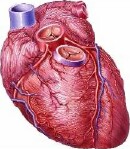 A service of the U.S. National Library of Medicine
A service of the U.S. National Library of Medicine  National Institutes of Health
National Institutes of Health

Extra Pounds May Offer Protection to Heart Failure Patients

THURSDAY, July 5 (HealthDay News) -- Heart failure patients who are carrying extra pounds have a lower risk of death and other heart failure-related health outcomes than thin or normal-weight patients, new research suggests.
Researchers call it the "obesity paradox." Obesity raises the risk of developing heart failure, but once people have it, excess weight is associated with lower risk of death, of needing a heart transplant and other problems, the researchers said.
In the study, researchers from University of California, Los Angeles analyzed information on about 2,700 heart failure patients who had their body mass index measured at the beginning of treatment and 469 patients who had their waist circumference measured.
Body mass index, or BMI, is a measure of height and weight. A BMI of 25 to 29.9 is considered overweight, while a BMI of 30 and up is obese.
Waist circumference measures fat accumulated around the belly, according to the researchers.
In the study, patients with a BMI of 25 or up were considered to have a high BMI. For men, 40 inches or more indicated a high waist circumference, while for women, 37 inches or more was considered high.
After two years, men with a high waist circumference and a high BMI were more likely to survive and were less likely to need a heart transplant. Similarly, women with a higher BMI also had better results than normal-weight women, while those with a large waist circumference "trended" toward better results, the researchers said.
In contrast, men with a normal BMI and smaller waist circumference had a 34 percent higher risk for adverse outcomes and normal-weight women had a 38 percent higher risk for adverse outcomes.
"The study provides us with more insight about how both genders of heart failure patients may be impacted by the obesity paradox," study senior author Dr. Tamara Horwich, an assistant professor of cardiology at the David Geffen School of Medicine at University of California, Los Angeles, said in a university news release. "Heart failure may prove to be one of the few health conditions where extra weight may prove to be protective."
About half of all heart failure patients are overweight or obese, the researchers noted. In heart failure, the heart can no longer pump sufficient blood to the rest of the body, the researchers said.
How excess weight protects heart failure patients remains unclear, according to researchers. But overweight and obese patients may be helped by increased muscle mass and metabolic reserves from fatty tissue, while increased body fat is also linked to higher serum lipoproteins, which may have anti-inflammatory properties.
The researchers added that symptoms of heart failure are often caught earlier in overweight and obese people. As a result, they may receive treatment sooner, which improves the likelihood of favorable outcomes.
The study was published online in the July 1 issue of the American Journal of Cardiology.
While this study found an association between excess weight and better outcomes for heart failure patients, it did not prove that the fat tissue itself, or that being overweight or obese, caused those patients to fare better.
SOURCE: University of California, Los Angeles, news release, July 3, 2012
- More Health News on:
- Body Weight
- Heart Failure